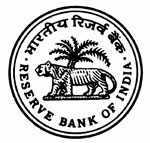
The Reserve Bank of India (RBI) - India's master bank - Friday released the final guidelines for issuing new bank licences, paving the way for corporate firms to enter the sector.
As per the final guidelines, the minimum capital requirement for opening a bank is Rs.500 crore.
Foreign shareholding in the new bank is capped at 49 percent.
"Entities/groups in the private sector, entities in public sector and Non-Banking Financial Companies (NBFCs) shall be eligible to set up a bank through a wholly-owned Non-Operative Financial Holding Company (NOFHC)," the RBI said.
The central bank said the entities applying for the new bank licences should have past records of "sound credentials and integrity, be financially sound with a successful track record of 10 years."
The new lenders would be required to open at least 25 percent of their branches in unbanked rural centres, which population is below 10,000.
Interested firms can apply for the new bank licences to the central bank till July 1, 2013.
At the first stage, the applications will be screened by the Reserve Bank India. Thereafter, the applications will be referred to a High Level Advisory Committee, the constitution of which will be announced shortly, the RBI said.
"The committee will submit its recommendations to the Reserve Bank. The decision to issue an in-principle approval for setting up of a bank will be taken by the Reserve Bank," it said.
The validity of the in-principle approval issued by the RBI will be one year.
Welcoming the new guidelines, the Associated Chambers of Commerce and Industry (Assocham) said the entry of new banks would enhance competition which will ultimately benefit customers.
Provisions regarding permitting existing non-banking financial companies to convert into banks will also meet the demand of NBFCs sector, said Rajkumar Dhoot, president Assocham.
--With IANS Inputs--
|
|


Comments: